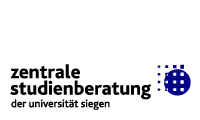Zentrale Studienberatung
im F-S Gebäude
Sandstraße 16-18
57072 Siegen
Erreichbarkeit der
studentischen Hotline:
0271 740-2712
Mo - Do: 9 - 16 Uhr
Fr: 9 - 12 Uhr
Mail:
info.studienberatung[at]
zsb.uni-siegen.de
Terminvereinbarung für eine Beratung über:
0271 740-2712
International Students
You find information about the admission procedure here:
STARTING
Impressum
Mathematics

Short Information
| Restricted
admission |
Regular
study time |
Winter
semester |
Summer
semester |
|---|---|---|---|
| no | 4 semester | ✔ | ✔ |
Admission procedure
Application required
You can apply here
Degree
Master of Science
More information
Language of instruction
English
Deadlines
The degree program
The two-year MSc program in mathematics is targeted at students with the university degree Bachelor of Science (B. Sc.) in mathematics or an equivalent subject. The degree program leads to the academic degree of Master of Science (M. Sc.) in four semesters.
The following minors can be chosen:
- Natural sciences and technology (computer science, mechanical engineering or physics)
- Business mathematics (economy or business information systems)
- Philosophy (German only)
The share of the minor is approx. 30%. Please note
that a BSc in engineering does not qualify you to enter an MSc
program in mathematics!
The master's degree program documents increased mathematical
competences and communication skills that make it possible to
work intently scientifically and as an instructor in an
(interdisciplinary) team and assess and develop new
methods.
The degree program teaches skills for analysis of abstract structures, recognising, phrasing and solving problems in mathematics and the minor. Subsequent doctoral studies (Dr. rer. nat.) are possible.
A mathematician is characterised not only by specialist knowledge, but in particular by the skills such as the ability to think abstractedly, logically and to comprehend and structure complex semester break. Possible tasks in business and industry are:
- Creation of risk forecasts (insurances)/analysis of the rate developments in the area of financial management (shares, etc.)
- Improvement of the encoding techniques for, e.g., online banking and phone, internet, music and images)
- Optimization of itineraries, e.g. for trains, buses and aeroplanes
- Development of mathematical models (automotive, aerospace, steel industry, medicine)
- Processing and evaluation of data, e.g. in banks and insurances
Admission requirements
1) Bachelor's exam in mathematics or at
least equivalent studies at a university completed. At least
the following competencies must be achieved:
- Analysis I-III (27 CP)
- Linear Algebra I (9 CP)
- Numerical Analysis (9 CP)
- Probability Theory (9 CP)
The achievements must be comparable to that of the
Bachelor’s degree program in Mathematics at the University of
Siegen. (9 CP is equivalent to 5% of a three-year bachelor's
degree.)
If the minimum scope above mentioned cannot be proven, the
admission to the Master's program is to be made dependent on
additional achievements from the bachelor's degree program.
A prerequisite for admission is also proof of knowledge of the
English language at level B2 of the Common European Framework
of Reference for Languages (CEFR).
2) The examination board can make admission of
applicants who completed a Bachelor's exam in a different
subject or with a different minor to the master's degree
program depending on additional assessment and subject-specific
examinations from the Bachelor's degree program.
3) The examination board may make admission of
applicants who have acquired the qualification for universities
of applied sciences, a Bachelor's degree at a university in the
scope of application of the German Civil Code or a degree
equivalent to the master's degree program dependent on
additional assessment and subject-specific examinations from
the Bachelor's degree program mathematics at the University of
Siegen.
The examination regulations relevant at the time shall
apply.
Important Information
Courses without international students will be held in German.
Study organization
Examination regulations/degree plan/module
manuals/internship rules
Examination regulations (POs) specify the basic structures of a
degree program (e.g. admission requirements and contents to be
studied). Students are automatically subject to the current
version of their PO when they matriculate for their first
subject-related semester. This means that even if the PO
changes during their studies, the original version according to
which they matriculated will remain valid (provided that the PO
does not expire).
The respective degree plan is the recommended example progress
of the studies in individual subjects and is part of a PO.
Supplementary provisions and details for any module to be
studied can be found in the module description (e.g.
requirements for taking a written test or content-related
information on the modules/events, ...).
We recommend at least looking at the study schedule for your
degree program before the lecture time starts, to ensure that
you know which modules are intended for the start of your
studies.


